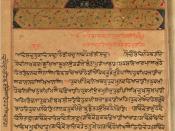In the year 1469 a man named
Guru Nanak was born into a Punjabi-Hindu family. His
name means "He who was born at the home of his mother's
parents", which was in Talwandi, near Labone ("Sikhs"
647). We know little about Nanak's life but a lot about his
beliefs from a book called " Adi Granth" or " Granth Sahib",
which means holy book. Some of his beliefs were the reality
of "karma" and "reincarnation".These are beliefs that our
actions in this life determine how high or low we'll be in our
next life. The Hindus and Muslims believe it is best to
worship, missionize, study and write the sacred scriptures,
and other religious public actions and behaviors. Nanak
believed that this is wrong. He felt that the people should be
involved in inward meditation to the God, Akal Purakh
(Nanak was a monotheist, believing in one god). Nanak
believed that Akal Purakh is the almighty creator and
sustainer of the universe and he has no form.
If one is truly
devoted to Akal then Akal may reveal himself to you in
"nam" or the divine name. Since Akal created the world and
everything in it then, the world can be considered an
expression of "nam",(McLeod 5). Akal, to reveal himself
through "nam", speaks the "sabad" or divine word, through a
loyal believer. This believer acts as the eternal guru, or
teacher, speaking in the mystical voice of Akal through the
"sabad". A guru can achieve this divine harmony with Akal
by the practice of "nam simaran". This can be accomplished
in many ways. One way is by the repeating of a "mantra", a
word that expresses the divine reality. Another way is to sing
devotional songs or even to have deep mystical
concentration. Guru Nanak attracted many disciples, or...



The Reality
The reality is that this is an extremely inaccurate essay on sikhism.
Firstly sikhism is not at all violent. It is a very peaceful religion. However, if threatened, it will go to war and not as ruthlessly as u have said here. Infact the sikhs did provide medical support to the injured in the battlefield. Sikhism is a very gentle religion, however it does not allow anyone to abuse it. AND Sikhism has not changed since Guru Naknak, it is still the peaceful religion it ever was.
Though there are elements of thruth there are many inaccuracies and i think there are many stories, like the police paying 1.70. I am from India and for a fact i know that this is completely untrue
This is a very badly done essay. You couldve improved it by:
1. Focusing on the change of belief in god. Sikhism, unlike other religions says that the teacher is to be respected more than God. The Gurus (Punjabi for teacher) were people who showed the way to god, they were not god and they were not sons of god. This is a very important change in Sikh philosophy that your essay does not provide.
2.You couldve said a bit more about its history, how it emerged in the 1400's, what was the need for Guru Nanak to have a new set of beliefs, how it was constantly under pressure from Islam from the 15-18 century and how it constantly protected those in need of its protection from Islam, mostly hindu pandits(priests).
3.You have not really talked about how Sikhs worship. There is no mention of Gurudwaras and religios events throughout the year.
4.You have not talked about the sikh way of life like Importance to women etc
This is an extremely bad, one dimensional essay. Even though Sikhism has its own set of problems it is not the type of religion you have portrayed it to be.
Much more work and research was to be done to make this essay much more effective, accurate and complete.
2 out of 2 people found this comment useful.